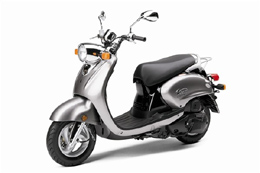 Since returning to Vancouver in January, I’ve noticed a change in the types of vehicles on the road. The automobile landscape in Vancouver has expanded to include two new vehicles: Smart cars, and scooters.
Since returning to Vancouver in January, I’ve noticed a change in the types of vehicles on the road. The automobile landscape in Vancouver has expanded to include two new vehicles: Smart cars, and scooters.
Before I left Silicon Valley, I was commuting to work on a Yamaha Vino 125 motor scooter. With oil exceeding $90 a barrel already in those days, it was a good decision. And apparently more people are agreeing with me – even before I left California I started noticing more and more scooters on the road in the final months. I even had people pull up beside me at stop lights and ask me about buying one. Although I sold my scooter upon my departure from California, I thought I’d do a quick run-down on the pros and cons for people considering making the jump to a scooter.
The Good
- It’s easy: Although California requires you to get a motorcycle license to drive a scooter, obtaining a license is simple, especially if you already have a driver’s license. You take a simple written test to get your learner’s license, and then take a weekend safety course that exempts you from the DMV road test. Note that if you already have a driver’s license, you will also need to renew your existing license when you take the motorcycle license written test. In BC, you can ride scooters under 50cc using only your regular driver’s license (although these are pretty wimpy)
- It’s cheap: While a Vespa will run you between $5K and $6K USD, Honda and Yamaha make some sporty alternatives that cost a little over $3K with tax and dealer fees. Insurance will run you about $250 for the year.
- It’s fuel-efficient: I racked up 2,588 miles in a year and a half, sipping a meager 35 gallons or so of gas along the way. That’s about 70 to 80 miles per gallon (34 km/litre)!
- It’s environmentally friendly: Not only are scooters more fuel efficient, but four-stroke engines in larger scooters have lower overall carbon dioxide emissions versus cars. Not only will you be saving money, but you’ll be dumping about 75% less CO2 into the air.
The Bad
- No freeway for you: Unless you go with one of high-end scooters with a larger engine, your state’s laws probably doesn’t won’t allow you to drive your scooter on the freeway. Which is OK, because…
- Car drivers are insane: Nothing proves this quite like a 5-ton minivan moving into your lane without a shoulder check. Hello?? Hellooo? I’m right here!
- It’s distance limited: A scooter’s ideal for commuting about 10 miles or so. Any further, and the inability to get on freeway becomes an impediment to timely travel. For me, that was perfect – I drove 10 miles a day. Who wants to spend life commuting?
- Your friends are jerks: In our macho North American culture, nothing emasculates quite as quickly as driving a 236-pound scooter to work instead of a 5-ton SUV.
- Rain sucks: Climate is a major consideration. While California only gets a couple showers during the year, those times can be deadly on a scooter. Low visibility, reduced traction, and even crazier drivers.
The Awesome
- Traffic? What traffic? Nothing wipes the superior smile off a car driver’s face like watching a cute little girly scooter pull into the space between traffic and disappear into the distance. It’s a good feeling. Unfortunately, lane-splitting is illegal in BC, so this doesn’t apply to Vancouverites. However, there are always situations where a little extra maneuverability comes in handy.
- Did I mention it’s cheap? When you’re getting 80 miles per gallon, your gas costs go through the floor. On average, I spent about $3 a week on gas. Total cost for the scooter for the first year, gas and insurance included, was less than $4K. Cost to run after you’ve paid off the scooter? Less than $35 a month.
Happy scooting!
